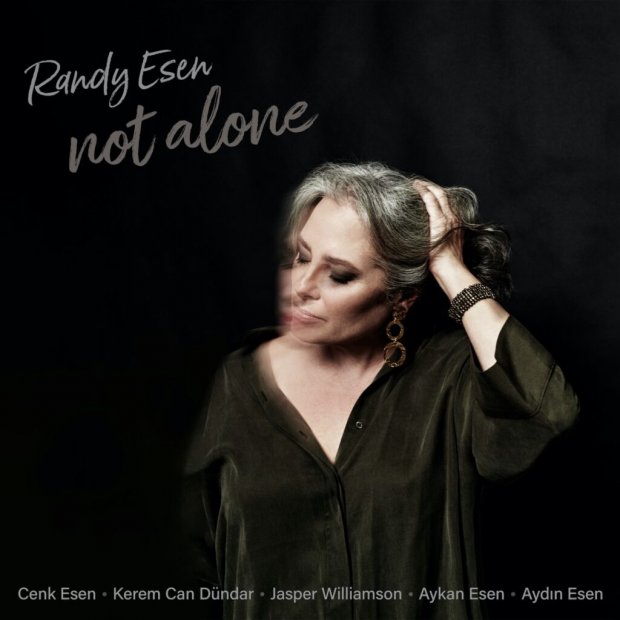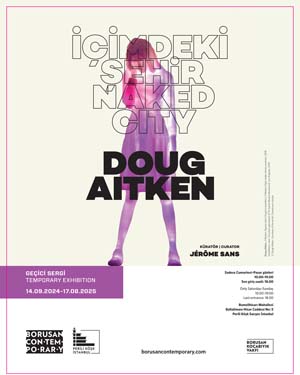The last time I heard Randy Esen sing was in July 2019, when she was performing at Uniq Istanbul with three other musicians: her husband Aydın Esen on piano and keyboards, Tommy Campbell on drums and Greg Jones on bass guitar. In my blog on this mega-memorable gig I wrote the following: ‘There are some concerts – not many, just a few – that leave you with a feeling of euphoria, allowing you to forget everything that makes life a burden for just a few precious hours. At this concert I was lulled, temporarily at least, into the delusion that another kind of existence is possible, and for that I am grateful.’ It is hardly surprising, then, that it was with a keen sense of anticipation that on February 9 I presented myself at the Cemal Reşit Rey concert hall for a performance by Randy Esen and the CRR Jazz Orchestra.
On my way through the park that leads down towards the venue from the side of the Harbiye Military Museum, I noticed that the cats that usually throng this space were strangely absent. Perhaps they were attending a ceremony to welcome the appearance of the Aquarius new moon, which was due to take place in six hours’ time, or perhaps they were holed up in some nearby spot, communally absorbed in psychic contact with a feline colleague – the one charged with attending the concert and relaying the music to its comrades over the feline airwaves. (In point of fact, cats frequently wander onto the stage at the Cemal Reşit Rey when something especially tasteful is going down.) Who knows?
I usually begin a blog on a jazz concert with a description of the main performer’s career, but on this occasion Randy Esen most graciously does this for me in the following interview, conducted by Tolga Bedir and available on his YouTube channel.
A few footnotes to the above interview. First, Randy describes her early musical activities, her training in psychology and its contribution to her current teaching activities. She tells us she has been teaching jazz vocal since 1996. Then, at 8:25, the conversation turns to her latest album Not Alone, produced by her younger son, Cenk, with help from her elder son, Aykan. At 11:51 she begins to describe the various musicians who contributed to the album: singers Elif Çağlar, Dila Bahar and Çağıl Kaya, rapper Şam (Şamil Oymak), guitarist Kerem Can Dündar, trumpet-player İmer Demirer, percussionist Jasper Williamson, keyboard-player Anıl Tuncer, and (on Borrowed Time) her husband, Aydın. Finally (at 15:47), she addresses the subject of what is currently happening – and changing – in the world of jazz.
The ancient Chinese classic Dao De Jing (or Tao Te Ching) makes the following pronouncement: ‘Not to honour the teacher / Nor to value the material / Though it seems clever, betrays great bewilderment.’ In accordance with this dictum, I am obliged to record that Randy Esen’s activities as a teacher have produced long-lasting positive results. She tells us (at 11:51 in the above video) that Elif Çağlar – who sings the title track on Not Alone and who greatly impressed me when she performed in the garden of the Palazzo Venezia in Beyoğlu a few years ago – was a pupil of hers when she taught at Bilgi University.
Another of the many aspects of Randy Esen’s artistry that inspire appreciation and respect is her openness (very likely engendered by her background in psychology) on the subject of negative mental states and how they affect us: describing the title track of Not Alone, she says that in this number, “we’re also talking about inner turmoil, inner torment, how we’re all searching for grace and light and hope in our lives, but we’re struggling with the angst, with the depression, with the alienation...”.
This theme is taken up again in Deniz Taşar’s interview with Randy and her two sons on the Bantmag website. During the course of this wide-ranging conversation Randy says: “We’re all conflicted, we’re all struggling between being grateful and hopeful, practising grace, but at the same time raging against the machine. We’re all – at different ages and different stages in life – dealing with this inner conflict.” One revelation towards the end of this interview that I found especially significant is the following: Cenk tells us his mother’s birthday is May 1. This makes her – in common with her husband Aydın – a Taurus, and from this fact the astrologer in me is tempted to draw a number of conclusions. Firstly, Taurus being the quintessential earth sign, it may explain why she faces life with such no-holds-barred realism. Secondly, as Taurus is under the rulership of beautiful, harmony-loving Venus, it may account for her frequent use of the term ‘grace’ (she uses it twice in the above quotations). The dictionary tells us that ‘grace’ means ‘smoothness and elegance of movement’ or ‘a polite and thoughtful way of behaving’ (both of these being Venusian attributes), but I personally go for the religious connotations, as in ‘by the grace of God’ – that is, ‘with the consent and approval of the divine’. Thirdly, I suspect she might well agree with something William Blake says in The Marriage of Heaven and Hell: ‘The worship of God is, honouring His gifts in other men each according to his genius.’ And indeed, her obvious respect for her fellow-musicians is a manifestation of the unselfishness that is one of Lady Venus’s most appealing traits. Fourthly, in medical astrology Taurus rules the neck and throat (including, of course, the voicebox), and it is undeniable that Randy Kartiganer Esen possesses one heck of a voice (Mashallah).
And so to the concert on February 9. Before the soloist made her appearance the Cemal Reşit Rey Jazz Orchestra, conducted by Nail Yavuzoğlu and consisting of woodwind and brass sections plus a piano, a guitar and a small string section, performed two numbers. It was noticeable that the quality of the orchestra’s playing (especially as regards the trumpet and saxophone solos) suddenly went up a notch after Randy arrived on stage. (I wonder why – could it have been that her professionalism prompted them to raise their game?)
One feature of the soloist’s performance that I found especially pleasing was her gestures (remember that ‘smoothness and elegance of movement’?). Another was her ability to dance up and down the various vocal registers with ease, swooping effortlessly from high to low with zero loss of tone. But it was her stage presence that made the strongest impression. Her unerring sense of drama allows her to move from light and breathy sweetness to full-throated passion, then back again to a muted and wistful world-weariness that holds the audience in thrall, willing captives to the spell she throws in her ‘wounded and broken’ moments.
I have a confession to make: I had difficulty in identifying the songs that were sung. Not being an aficionado of jazz compositions, I am familiar only with the best-known classics. As a result, when the singer announces the next number I frequently fail to catch its title. I can, however, state with confidence that at various times during this concert there were some highly enjoyable solos from the guitar, saxophones, piano and drums – though the string section, particularly the violins, seemed not to realise until well towards the end that their intonation was in need of serious attention.
And speaking of the end, before embarking on her encore the soloist made a confession, stated with typical Taurean down-to-earth bluntness: “We’ll see what’s left – gettin’ old.” Judging from her ability to maintain the volume throughout an hour-long performance, we in the audience had reason to doubt that statement, though we could not doubt the authority with which it was made: Taureans are definite, and when Randy Esen says something, it comes across with such finality that you believe it. Perhaps it is this feature that enables her and her husband to communicate emotion with such unequivocal (the pun in the ‘vocal’ part is intended, by the way) genuineness, sincerity and sheer power.
And so to some recordings. Firstly, here is a video of a concert that took place in Istanbul in 2023. Randy Esen is sharing the stage with Burak Bilgili, accompaniment once againprovided by the CRR Jazz Orchestra. At 0:48:26 we hear a song that on the part of the singer is a model of voice control and perfect intonation, combined with appropriate physical movements. Enjoy the extended notes, the phrasing and the nonsense syllables, but (for heaven’s sake) ignore the violins.
Next, a track from Not Alone – not the title track, but the weird and wonderful Man from Mars. The guitarist is Kerem Can Dündar, the keyboard-player and effect-supplier Cenk Esen, and the trumpeter the inimitable İmer Demirer, about whom Randy says the following in her interview with Tolga Bedir: “İmer ... Man, I mean, what can I say... he was the only choice for the reflective voice. He’s like my alter ego.”
Randy’s first solo album, Behind the Light and Shine, appeared in 2019, and here is a track from it: Last Chance. The piano part is played by Aydın Esen, a master musician whose take on atonality is so aesthetically pleasing that one might wish Arnold Schoenberg (who invented atonal music but was unable – except, possibly, in his ‘melodramatic’ song-cycle Pierrot Lunaire – to make it sound good) had taken lessons from him.
Finally, a video about the making of Behind the Light and Shine in which we see Aydın and Randy’s sons Ayhan and Cenk, plus Ra Kalam (‘the inaudible sound of the invisible sun’) Bob Moses, the percussionist who had a hand – or rather, two – in the music’s creation. In her double dedication to this album, Randy says the following:
Dedicated to my parents, Norman and Patricia Kartiganer, for giving me the gift of music.
To Aydın Esen, my life partner, muse and greatest creative inspiration... The gratitude and joy I feel in being a small part of your rich and unfathomable landscape is indescribable and a true, true blessing.
I chose this video to end with because it shows what we might call the ‘Esen legacy band’ in its entirety, and I hereby invoke the aid of Lady Venus, goddess of good fortune, to keep all its members safe and sound so that they can continue to make, with their music, our best and worst moments meaningful.








